Global value chains and the Commonwealth
- Centre for International Business at the University of Leeds

What are global value chains?
Global value chains (GVCs) represent the flow of production and distribution activities across countries, starting from raw materials, all the way through to final consumption. The GVC phenomenon, primarily driven by the forces of globalisation, allows firms to re-configure their production and distribution activities into locations where such activities can be best performed. It is widely acknowledged that GVCs provide the formula for achieving increased productivity, economic growth, job creation, and better living standards across the globe. Given the rising importance of GVCs in the global economy, scholars are increasingly becoming interested in understanding the aspects related to their governance and organisation.
In 2019, the Commonwealth Research Network in International Business (CRN-IB), based at the James E. Lynch India and South Asia Business Centre, Leeds University Business School, in collaboration with the Academy of International Business, convened a symposium on ‘Global Value Chains and the Commonwealth’.
The symposium focused on strengthening participation of the Commonwealth countries in GVCs and presented a case of value chains exclusively for the Commonwealth countries, labelled as ‘Commonwealth Value Chain’. It was argued that the geographic location and endowment of resources held by the Commonwealth countries place them in a promising position to develop this value chain.
Why is “bridging the gap” important?
By bringing together eminent scholars, industry experts, and policy makers, and “bridging the gap” between the different sectors, the symposium revealed some very important aspects relating to GVC and the Commonwealth (as outlined below), as well as raising a number of questions that should be addressed, collaboratively, by future research efforts.
It is clear that more research is needed on the Commonwealth countries and GVCs. The benefits of such research are immense and would feed into a wide range of stakeholders activities across the globe. Events like the ‘Global Value Chains and the Commonwealth Symposium’ can help in forming a community of researchers, policy makers and businesses, enhancing the impact of academic research in society.
In review - ‘Global Value Chains and the Commonwealth’ Symposium
On the evening of 29 July, Professor Sarianna Lundan, University of Bremen, and Professor Mohan Kaul, a champion of globalisation and an influential and recognised policy adviser, opened they symposium with keynote presentations.
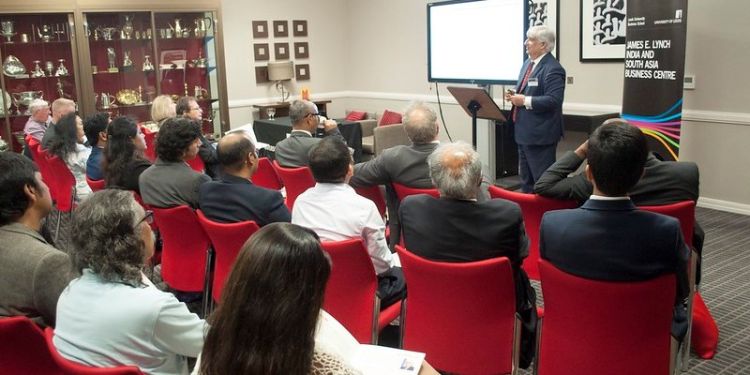
Professor Mohan Kaul presenting at the Global Value Chains and the Commonwealth Symposium.
The Rt. Hon Lord Howell, President of Royal Commonwealth Society, began the second day’s proceedings (30 July) by delivering the keynote address, focussing on the importance of the Commonwealth for the UK. Following the keynote, the second day of the symposium continued with three panel sessions:
- Panel I - ‘The Role of Commonwealth Countries in Re-configuring Global Value Chains’
- Panel II - ‘Foreign Direct Investment and Foreign Trade Advantages in Commonwealth Countries’
- Panel III - ‘International Entrepreneurship, Diaspora and Expats: The Conduits of International Business in Commonwealth Countries’
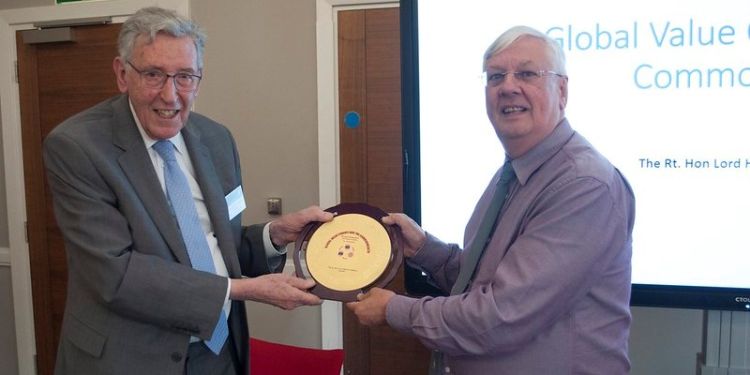
The Rt. Hon Lord Howell and Professor Peter Buckley.
Thirteen panellists drawn from a range of professional backgrounds, presented their views surrounding the value and methods of participation in GVCs. Speakers emphasised the importance of GVCs for growth of local economies of the Commonwealth countries. There was a scepticism on how the theoretically perceived values can be translated into practice, as a coordinated political approach is needed to fully realise the benefits of GVCs for Commonwealth countries. However, there was agreement that the Commonwealth is well placed to achieve this with its secretariat and regular meeting of Heads of Governors.
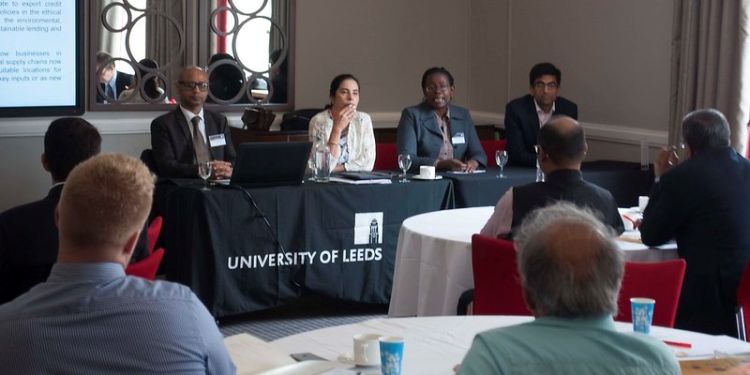
Day two panel discussion
Each symposium panel involved a rich discussion and delegates strengthened the debate by raising interesting questions, as well as sharing their interpretations and comments to panellists and other attendees.
The symposium concluded with a closing address given by two diplomats: Dr Arun Puri, Consul General of India, Birmingham and Mr Abu Nasar Md. Anowarul Islam, Assistant High Commissioner of Bangladesh, Manchester. Both diplomats expressed the need, and their support, for research in this area. It was highlighted that the economies of the UK, India and Bangladesh, along with other Commonwealth countries, complement each other in many ways.
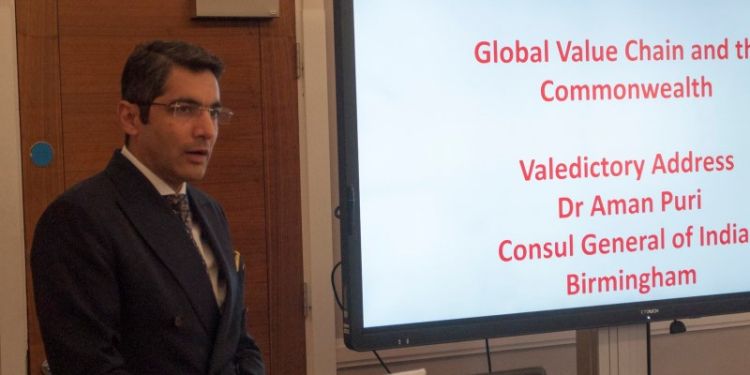 Dr Aman Puri giving his closing address at the Symposium
Dr Aman Puri giving his closing address at the Symposium
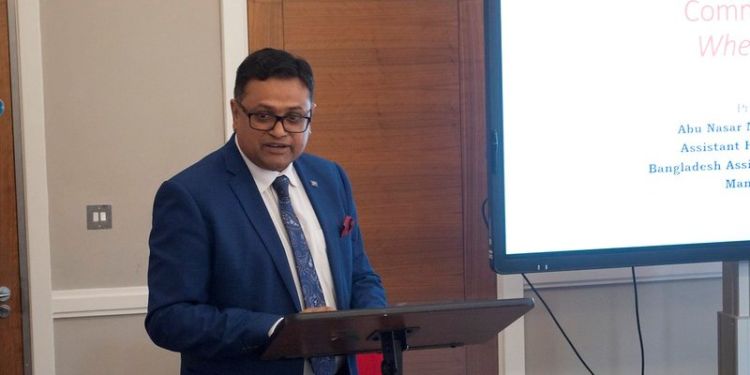
Mr Abu Nasar Md. Anowarul Islam giving his closing address at the Symposium
Focus for future research on the Commonwealth and GVCs
Empirical research is needed to explore the current level of participation of the Commonwealth countries within the GVCs and the pitfalls that are holding them back.
Research should also investigate the proposition of a Commonwealth Value Chain by examining the resources held by Commonwealth countries and suggest a coordinated policy framework to achieve a Commonwealth Value Chain.
Contact us
If you would like to get in touch regarding any of these blog entries, or are interested in contributing to the blog, please contact:
Email: research.lubs@leeds.ac.ukPhone: +44 (0)113 343 8754
Click here to view our privacy statement. You can repost this blog article, following the terms listed under the Creative Commons Attribution-NonCommercial-NoDerivatives 4.0 International licence.
The views expressed in this article are those of the author and may not reflect the views of Leeds University Business School or the University of Leeds.

